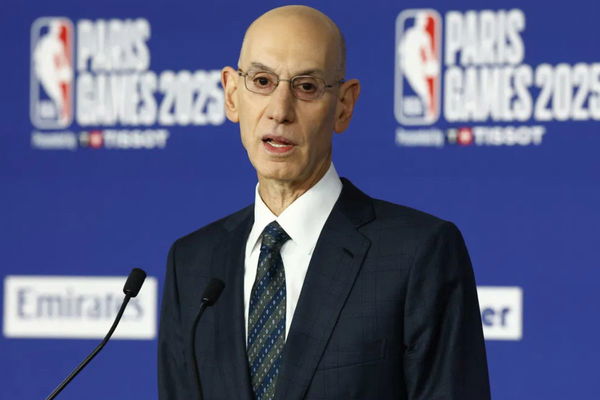
USA Today via Reuters
Jan 16, 2024; Los Angeles, California, USA; LA Clippers owner Steve Ballmer watches the game against the Oklahoma City Thunder at Crypto.com Arena. Mandatory Credit: Kirby Lee-USA TODAY Sports

USA Today via Reuters
Jan 16, 2024; Los Angeles, California, USA; LA Clippers owner Steve Ballmer watches the game against the Oklahoma City Thunder at Crypto.com Arena. Mandatory Credit: Kirby Lee-USA TODAY Sports
What began as whispers of impropriety has quickly erupted into one of the most serious controversies the NBA has faced in years. At the center is Clippers owner Steve Ballmer, who has openly called for an investigation into his own franchise after reports surfaced linking Kawhi Leonard’s $28 million endorsement deal with Aspiration, a now-bankrupt green banking firm Ballmer had invested $50 million into. The accusation? The payment was made to potential salary cap circumvention.
Watch What’s Trending Now!
The allegations, first detailed by journalist Pablo Torre, point to a suspicious arrangement: Leonard signed a multimillion-dollar contract with Aspiration, never appeared in any campaigns, and the deal included a clause tying its validity to his tenure with the Clippers. Coupled with Aspiration’s financial collapse and Ballmer’s investment ties, the revelations raise urgent questions not just about one team, but about how far the NBA must go in policing owner-player business relationships to preserve the integrity of the salary cap.
ADVERTISEMENT
“I’d want the league to investigate, take it seriously,” Ballmer had told ESPN. Ballmer might not have expected this to ricochet across the league, but his push for transparency might just do that. If the investigation into the Clippers’ dealings with Leonard and Aspiration reveals enough, Adam Silver may have to adjust the threshold for what constitutes actionable circumvention of the salary cap. Bryce Simon from The Game Theory Podcast raised an important point,
“Let’s say there’s six other… maybe there’s none… but are those six owners who are—who could they be—and what kind of weight and power do they have? And could that affect Adam Silver’s threshold…?”
ADVERTISEMENT
ADVERTISEMENT

Reuters
[US, Mexico, & Canada customers only] Jan 23, 2025; Paris, FRANCE; NBA commissioner Adam Silver speaks before the Paris Games 2025 NBA basketball game between the San Antonio Spurs and Indiana Pacers at Accor Arena. Mandatory Credit: Stephanie Lecocq/Reuters via Imagn Images
ADVERTISEMENT
The implications of Ballmer’s involvement, even if accidental or circumstantial, suggest a scenario where a team might have used a shell company to pay a player nearly $50 million beyond what league rules permit. And many believe this may just be the entrance to a precarious rabbit hole. If such a huge payment could have fallen through the cracks wrt. one of the biggest players in the league, should other franchises also be investigated?
ADVERTISEMENT
Major warning for other franchises
No team is speaking up publicly. That silence? It might be fear. Zach Lowe’s segment with legal expert Michael McCann carried a sobering warning, “While other teams may be rooting for punishment, they better be careful what they root for… they may suddenly get a new policy that changes how they interact with sponsors.”
McCann explained that if the NBA determines the Clippers broke the rules, it may decide to close this loophole entirely. That would mean teams could be held accountable for any sponsor-player relationship, something not currently governed by the Collective Bargaining Agreement. “I could see the Players Union saying, ‘Wait a second. You don’t have a right to be policing endorsement deals.’”
ADVERTISEMENT
What starts with Ballmer and Leonard could snowball into an all-out regulatory overhaul. McCann called it “bad for teams.” Because the second the league demands owners be held accountable for off-court business ties with players, every handshake deal between corporate sponsors and stars becomes evidence. Bryce Simon was blunt about what this case represents “We both think this is extremely fishy and neither of us condone it… there’s obviously a ton, a ton of stuff… enough to meet the threshold of circumstantial proof or evidence.”
And Sam Vecenie made the stakes clear,“I think they’re going to punish them. I think they should punish them based off of what we’ve seen so far. The question is like the level of punishment.” He continued,“To me throwing the hammer of like getting rid of all of their five picks… yeah… that’s not unreasonable.”
ADVERTISEMENT
The setup was suspicious from day one. Aspiration inked a $300 million sponsorship deal with the Clippers in September 2021. Two months later, Ballmer introduced Aspiration to Leonard. By early 2022, Leonard signed a $28 million endorsement deal with no public-facing deliverables. The contract even included a clause, that if Leonard left the Clippers, the deal would terminate.
By March 2025, Aspiration was bankrupt. Ballmer says he was conned. He claims to have had no board seat, no control, and that his stake in the company was under 3%. “They conned me… I have no ability to predict why they might have done anything they did.” But as Bryce pointed out, “The employees… if that was truly being said going around the office… that obviously would be as well.” This wasn’t just a one-time oversight. This was a full business entanglement wrapped in NDAs, bankruptcy filings, and endorsement contracts with no receipts.
Whether the Clippers ultimately escape severe punishment remains to be seen. But for the other 29 teams, the message is already clear, if the league proves the Clippers used a third-party business to skirt salary cap restrictions it will set a precedent. And that precedent could force all teams to reassess how deeply their owners, sponsors, and players are allowed to mix.
ADVERTISEMENT
ADVERTISEMENT
ADVERTISEMENT
ADVERTISEMENT